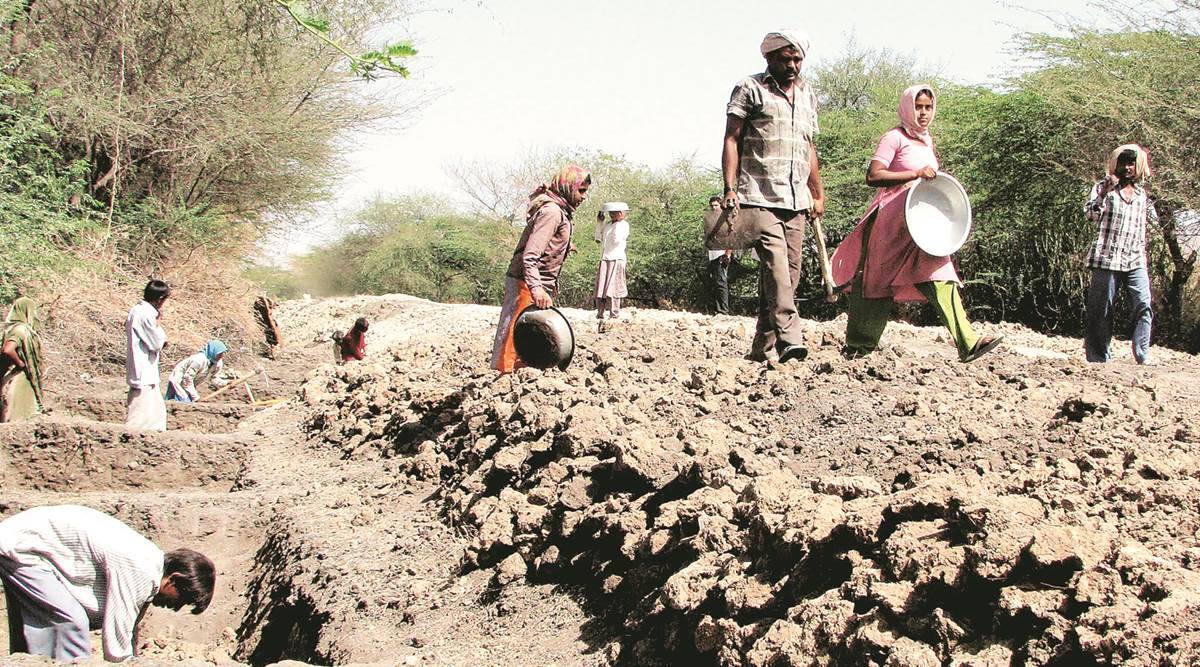While the decline in demand is significant, it is still higher than the work demanded and generated in the country since 2014-15.
 AFTER THE highest-ever work demand generated during the last financial year, demand for work under the Mahatma Gandhi National Rural Employment Guarantee Scheme (MGNREGS) has seen a decline in this financial year. However, the figures continue to be on the higher side with work demand generated during 2021-22 being the second highest since 2014-15.
AFTER THE highest-ever work demand generated during the last financial year, demand for work under the Mahatma Gandhi National Rural Employment Guarantee Scheme (MGNREGS) has seen a decline in this financial year. However, the figures continue to be on the higher side with work demand generated during 2021-22 being the second highest since 2014-15.
In the last financial year, work demand from rural India surged to a record high as the pandemic-induced lockdown and job loss saw large scale migration to rural areas from the urban centres. During 2020-21, around 13.32 crore people applied for work of which 13.29 crore were offered work. In 2021-22, till date 11.30 crore people have applied for work of which 11.22 crore has been offered work.
While the decline in demand is significant, it is still higher than the work demanded and generated in the country since 2014-15. Work demand in 2014-15 was 6.73 crore of which 6.71 crore were offered work. The demand for work has been hovering between 7 and 9 crore with work offered in the same range.
The highest amount of work offered was in 2020-21 which was at 13.29 crore, while the lowest work generated was 9.02 crore against a work demand of 9.11 crore in 2018-19.
MGNREGS, a flagship program of the Central government guarantees work to unskilled and semi-skilled people from rural areas on demand.
Implemented at the gram panchayat level, this scheme allows people to demand work and in case the demand is not met, they are eligible for unemployment benefits.
The original Act had allowed for the generation of 100 workdays, which was relaxed during the pandemic.
This scheme has become a major job generator during the pandemic as work in urban areas started drying up due to lockdown and economic situation.
While the lockdown has been lifted it is seen that demand for work under the scheme remains high.
Officials said that this is mainly due to the reluctance of many to return to cities given the uncertainty resulting from the pandemic.
“Many unskilled workers have decided to remain at home and this reflects in the higher-than-usual work demand generated. In case there is another lockdown or economic disturbance announced, reverse migration can take place again,” a central government official said.
 AFTER THE highest-ever work demand generated during the last financial year, demand for work under the Mahatma Gandhi National Rural Employment Guarantee Scheme (MGNREGS) has seen a decline in this financial year. However, the figures continue to be on the higher side with work demand generated during 2021-22 being the second highest since 2014-15.
AFTER THE highest-ever work demand generated during the last financial year, demand for work under the Mahatma Gandhi National Rural Employment Guarantee Scheme (MGNREGS) has seen a decline in this financial year. However, the figures continue to be on the higher side with work demand generated during 2021-22 being the second highest since 2014-15.In the last financial year, work demand from rural India surged to a record high as the pandemic-induced lockdown and job loss saw large scale migration to rural areas from the urban centres. During 2020-21, around 13.32 crore people applied for work of which 13.29 crore were offered work. In 2021-22, till date 11.30 crore people have applied for work of which 11.22 crore has been offered work.
While the decline in demand is significant, it is still higher than the work demanded and generated in the country since 2014-15. Work demand in 2014-15 was 6.73 crore of which 6.71 crore were offered work. The demand for work has been hovering between 7 and 9 crore with work offered in the same range.
The highest amount of work offered was in 2020-21 which was at 13.29 crore, while the lowest work generated was 9.02 crore against a work demand of 9.11 crore in 2018-19.
MGNREGS, a flagship program of the Central government guarantees work to unskilled and semi-skilled people from rural areas on demand.
Implemented at the gram panchayat level, this scheme allows people to demand work and in case the demand is not met, they are eligible for unemployment benefits.
The original Act had allowed for the generation of 100 workdays, which was relaxed during the pandemic.
This scheme has become a major job generator during the pandemic as work in urban areas started drying up due to lockdown and economic situation.
While the lockdown has been lifted it is seen that demand for work under the scheme remains high.
Officials said that this is mainly due to the reluctance of many to return to cities given the uncertainty resulting from the pandemic.
“Many unskilled workers have decided to remain at home and this reflects in the higher-than-usual work demand generated. In case there is another lockdown or economic disturbance announced, reverse migration can take place again,” a central government official said.